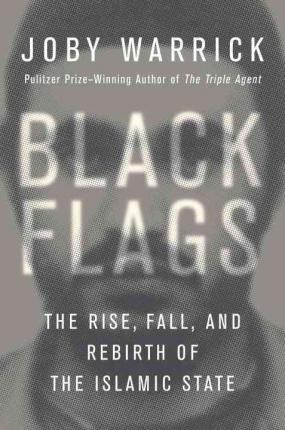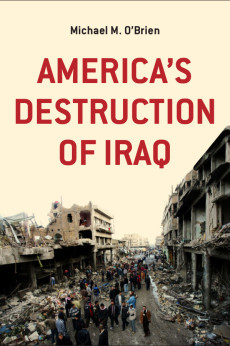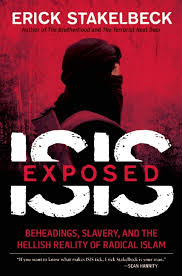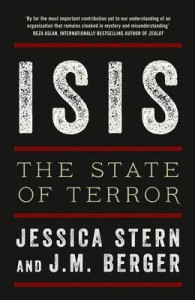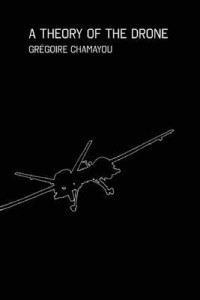Pulitzer Prize winning journalist Joby Warrick reveals in Black Flags: The Rise, Fall, and Rebirth of The Islamic State how the stain of militant Islam now raising its banner across Iraq and Syria spread from a remote Jordanian prison with the unwitting aid of American military intervention. When he succeeded his father in 1999, King Abdullah of Jordan released a batch of political prisoners in the hopes of smoothing his transition to power. Little did he know that among those released was Abu Musab al-Zarqawi, a man who would go on to become a terrorist mastermind too dangerous even for al-Qaeda and give rise to an Islamist movement bent on dominating the Middle East. Zarqawi began by directing hotel bombings and assassinations in Jordan from a base in northern Iraq, but it was the American invasion of that country in 2003 that catapulted him to the head of a vast insurgency.
By identifying him as the link between Saddam and bin Laden, the CIA inadvertently created a monster. Like-minded radicals saw him as a hero resisting the infidel occupiers and rallied to his cause. Their wave of brutal beheadings and suicide bombings continued for years until Jordanian intelligence provided the Americans with the crucial intelligence needed to eliminate Zarqawi in a 2006 airstrike. But his movement endured, first called al-Qaeda in Iraq, then renamed Islamic State of Iraq and Syria, or ISIS, seeking refuge in unstable, ungoverned pockets on the Iraq-Syria border. And as the Syrian civil war broke out in 2011, ISIS seized its chance to pursue Zarqawi’s dream of a sweeping, ultra-conservative Islamic caliphate. Drawing on unique access to CIA and Jordanian sources, Joby Warrick weaves together heart-pounding, moment-by-moment operational details with overarching historical perspectives to reveal the long trajectory of today’s most dangerous Islamic extremist threat.
As a sample of Warrick’s writing, below are excerpts from an article published by Centre for Research on Globalisation, which was established on the 9th of September 2001, two days before the events of September 11. Barely a few days later, Global Research became a major news source on the New World Order and Washington’s “war on terrorism”. In an era of media disinformation, their focus was essentially to be a center on the “unspoken truth”.
Here are the excerpts:
What is an Information War?
Different technologies and modes of communication are used to enforce certain themes in the conflict. Language, selective words, particular expressions, specific pictures, multimedia presentations, and communication are all the ammunition for the war.
The aims of information warfare are to use discourse to influence populations across the world and to establish a total monopoly on the flow of information, the perceptions of audiences, and the discursive processes shaping the modern world. At its basis power and relationships are being realized through mass media communication.
The messages and ideas that the mass media transmit through mass communication are constructed by those that control the media and, in succession, used by them to construct the perceptions of audiences. Since what the majority of people in most modern societies know is heavily shaped by the mass media, the mass media is used to lead audiences into forming certain opinions and to make their decisions on the bases of those opinions. This is done either subtly or overtly through the delivery of repetitive messages.
The messages, being delivered to audiences by the mainstream media and information networks, are generally a form of social action, because the delivery of information by these outlets takes the reactions of audiences into account before any information is disseminated. The reactions that are taken into consideration include physical reactions or material processes. This also includes considerations about the manifestation of protests as a reaction to the information delivered or economic considerations such as investor withdrawals, currency devaluation, and market shifts.
Monopolizing the narrative being delivered to the public and discrediting alternative or rival narratives, be they true or false, is an important aspect of the information war. Although this form of warfare is not new, it is becoming increasingly sophisticated and intensifying as it becomes an important tactic in the tool box of non-conventional warfare that is becoming increasingly characteristic of the current century.
The type of information management that both privately-owned and publicly-owned major news networks seek eventually creates what social scientists call a common sense assumption that informs the actions and reactions of the audiences towards particular subjects and situations. These common sense assumptions are not based on any real facts that exist in the real world, but are formed on the basis of what has repeatedly been presented as fact and conventional knowledge. In the reporting of international affairs the deeply politicised messages being delivered to audiences have led to common sense attitudes that believe that Shiite Muslims and Sunni Muslims are bitter blood enemies or that Hugo Chavez was a autocrat or that there is an irreversible deep seated hatred between Serbs and Croats. None of these assumptions are grounded in reality, but it has slowly trickled into the canon of false assumptions that inform a segment of international audiences about international issues. Moreover, in many cases these messages are delivered under the disguise of apolitical neutral objectivity, which prevents large portions of the audience from questioning the motives and implications of the messages being transmitted.
Ukraine is currently a front, just as Syria and Venezuela are, in a global information war, which is being reflected through a battle of the international media networks. The objectives of this media war are to secure and manage domestic and international public opinion in support or opposition of the coup that took place in Kiev and the new Ukrainian transitional government in Kiev.
International Media War: Move over BBC World and CNN International
The United States of America used to enjoy a near monopoly in the dissemination of information in the international media, but that has changed over the years as countries like Russia, Iran, China, and Venezuela respectively setup international news networks like Russia Today (RT), Press TV, Chinese Central Television (CCTV), and the pan-Latin American La Nueva Televisora del Sur (teleSUR) to challenge the international media networks of the US and its allies. These new anti-establishment international media networks — if they can be described thus — from Russia, Iran, China, Venezuela, and elsewhere collectively begun to challenge the status quo in the international media.
The prevailing narratives being presented by the dominant international news networks, particularly the Atlanta-based Cable News Network (CNN) and the state-owned British Broadcasting Corporation (BBC), which had a near monopoly on the international stage, were disrupted and slowly eroded. To borrow from the words of Russian President Vladimir Putin, while he was visiting the Moscow studios of RT in June 2013, the task of anti-establishmentarian international news networks like RT is to “try to break the Anglo-Saxon monopoly on the global information streams.”
The newer international news networks, like RT and Press TV, became so effective in challenging the discourse being propagated by major news networks like CNN, BBC, Fox News, and Sky News that American and British officials began to reconsider their media strategies and examine ways to challenge and cripple the international news networks challenging their control on the flow of information. The steps taken by the US and its allies included the blocking of the English-language Press TV, the Arabic-language Al-Alam, and other state-owned Iranian stations in Europe and elsewhere.
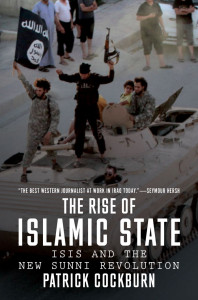 The near monopoly that the US and Britain enjoyed on the international stage was clearly broken by the time 2011 arrived as many viewers began to diversify their sources of information. Stations like CNN and BBC were heavily discredited about their coverage on the US-led NATO war against the Libyan Arab Jamahiriya.
The near monopoly that the US and Britain enjoyed on the international stage was clearly broken by the time 2011 arrived as many viewers began to diversify their sources of information. Stations like CNN and BBC were heavily discredited about their coverage on the US-led NATO war against the Libyan Arab Jamahiriya.
Hillary Clinton, while she was the sixty-seventh secretary of state of the US, was even forced to publicly outline the important role that international news networks and the mass media played in the success of US foreign policy. While speaking to a 2011 congressional committee dealing with foreign affairs in the US Congress, Clinton declared that Washington was losing the global information war. She told the committee she was testifying that the US needed to revert to Cold War-style media transmissions and outreach methods while requesting increased funding for US state media operations as a means of waging an information war against foreign media networks that carry diverging messages. She denounced RT without naming it directly, describing it as the English-language channel of the Russians and saying “it is quite instructive.”
Secretary Clinton lamented that the US and the state-owned BBC were cutting back their international media operations and that Washington needed to reverse the cutbacks “to get America’s message out.” She, however, was wrong about the US and BBC cutbacks. Resources were not the issue; the decreasing number of audiences tuning in to stations like CNN International or BBC World was the real problem.
Clinton’s statements echoed the state-run Broadcasting Board of Governors US federal agency, which runs Radio Free Europe, Voice of America (VOA), Alhurra in Iraq, and all the state-run international broadcasting of the US. Walter Isaacson, its chairman, declared a few months earlier that the US was waging an information war and that “America cannot let itself be out communicated by its enemies.” Isaacson, who was formerly the CEO of CNN, also emphasized that “delivering the news top down needs to be complemented by a new approach that catalyzes social networks.” This is very important to keep in mind when considering the interface between anti-government protests, social media, and the mainstream media.
While addressing Secretary Clinton’s 2011 declaration about US involvement in a global information war, the coverage of the mainstream media in the US about her statements was selective and distorted to portray a friendly and innocent image of the US government simply working to communicate with the outside world. Instead of displaying any reflectivity or making any substantive analytical reports explaining that what was taking place on Capitol Hill was a discussion by US officials about sharpening the US government’s overseas propaganda and dominating the information available to the international public, US media outlets casually glossed over Secretary Clinton’s statements at the hearing or entirely overlooked it.
The Washington Post, for example, made no attempt in its reporting to analyze what Clinton and the US senators were discussing. For instance, when Senator Richard Lugar, a known war hawk and military expansionist, said that the international media operations of the Broadcasting Board of Governors are “still a great force of diplomacy, to get our message across,” The Washington Post’s Pulitzer Prize-winning reporter Joby Warrick did not even elaborate that what Lugar was talking about was the US government exerting its power over other nations by using the mass media to influence their governments through a US-tailored flow of information to their populations.
This passiveness of the mainstream media that the coverage on Clinton’s testimony demonstrated is usually justified on the basis of a false objectivity. This is very common when it comes to important issues involving governments, corporations, individuals, or entities that the mainstream media do not want to criticize or undermine. The claim is that the facts are simply being reported without bias or subjective interpretations.
The US mainstream media coverage of the event would have been much different if it were a Russian official speaking to a parliamentary committee in the Duma about using the Russian media to influence foreign countries. The same standards are not applied when these same outlets deal with rival entities. Instead assertive reporting that involves an active or assertive voice by the mainstream media about the news being covered is then applied to attack or undermine the decisions and actions of these rival entities in the name of investigative journalism and critical analysis.
 Western Media Lashes out at Iranian, Chinese, Russian Media on Failures in Syria
Western Media Lashes out at Iranian, Chinese, Russian Media on Failures in Syria
While there has been an ongoing information war, a very distinct media war began to become visible in 2011. The NATO war on Libya, where international media networks played an important role in the war effort, highlighted this. The new anti-establishment news networks had matured enough to challenge US propaganda and provide alternative narratives that challenged the legitimacy of the broadcasts from CNN and BBC, even hurting their credibility and reducing their international and domestic viewership. Libya, however, was merely the start whereas Syria displayed an open and intense conflict between these news networks being fought mainly in the English, Arabic, and Spanish languages. The effectiveness of the anti-establishmentarian media networks in challenging the discourse of networks like CNN, BBC, Fox News, and Al Jazeera about Syria demonstrated that the days of a US stranglehold on the flow of information where long gone.
The US and British media began to very distinctly condemn the Chinese, Iranian, and Russian international media networks for their narratives about Syria by the start of 2012. The BBC incorrectly claimed, as one of its titles illustrated, that the “Chinese, Iranian press alone back UN Syria veto” on February 6, 2012 while Robert Mackey of The New York Times opined that, as the title for his text illustrates, the “Crisis in Syria Looks Very Different on Satellite Channels Owned by Russia and Iran” a few days later, on February 10, 2012. Lashing out at the perspectives of the Chinese, Iranian, and Russian media, the US and British press overlooked the segments of the African, Arab, Asian, European, and Latin American media that shared the same views as the Iranian, Chinese, and Russian media in countries like Algeria, Argentina, Belarus, Bolivia, Brazil, Cuba, Ecuador, El Salvador, India, Iraq, Lebanon, Namibia,  Serbia, South Africa, Ukraine, and Venezuela. While trying to deliberately undermine and understate the support that Syria enjoyed from a segment of the international community to their audiences, the US and British media betrayed the frustration of the political agendas of the directorships controlling their discourse.
Serbia, South Africa, Ukraine, and Venezuela. While trying to deliberately undermine and understate the support that Syria enjoyed from a segment of the international community to their audiences, the US and British media betrayed the frustration of the political agendas of the directorships controlling their discourse.
The media war is a reflection of rivalries between powerful actors in the real world. This is why it should come as no surprise that it was during the same juncture that Hillary Clinton began to publicly exhibit US frustration against the Russians and the Chinese. Secretary Clinton began lecturing her fellow foreign ministers from the other countries gathering at the international conferences that support regime change and military operations against Syria. She told the other foreign ministers that the Russians and Chinese had to “pay a price” for opposing Washington’s idea of “progress.”
It is worth revisiting Clinton’s statements from July 2012. She said as follows: “I don’t think Russia and China believe they are paying any price at all — nothing at all — for standing up on behalf of the Assad regime. The only way that will change is if every nation represented here [at the conference] directly and urgently makes it clear that Russia and China will pay a price because they are holding up progress — blockading it — that is no longer tolerable!” Clinton’s definition of progress in Syria, it should be mentioned, means regime change in Damascus and a military bombing campaign against the Syrians. She was expressing Washington’s rage, because she made the statement after Moscow and Beijing refused to allow the US, Britain, and France to get the United Nations Security Council to authorize a war against Syria.
After Washington displayed its infuriation at Russia for preventing regime change in Syria, the US began to seriously contemplate ways it could apply sanctions against the Russians and methods to target the international Russian media networks in the information and media war being waged between the two camps. Those considerations are now materializing or being activated with the crisis in Ukraine. The calls for sanctions against the Russians, however, are not merely the result of the crisis in Ukraine; they are part of an inclination that Washington already had and even consideration by US officials on how to undermine the mega oil-for-goods trade deal that the Russians and Iranians have been negotiating.
The Dangerous Abuses of Mass Media Communication in the Information Age
The divisions that exist between the US and Russia will harden as the situation in Ukraine continues to simmer. The ramifications of this crisis will be felt globally from Syria, the Korean Peninsula, and the United Nations to the negotiating table about the Iranian nuclear program between Tehran and the P5+1.
Ultimately, the waging of an information war between the US and Russia may sound appropriate for a juncture in history that has been dubbed the Information Age. Its role, however, is a gloomy one. The control and manipulation of information by the mass media prevents individuals from being authentically cognizant about the world around them and the social relationships that are behind the structures of their daily lives. Its power to inform decisions, socialize individuals, and shape popular culture is being misused.
 The information war is not only waged between rival powers and economic blocs. The control and manipulation of information is used internally by governments and corporations against the lower echelons of society. It atomizes information as a means of creating a blinding closed system that ignores the social realities about privilege and the unequal distribution of wealth and power.
The information war is not only waged between rival powers and economic blocs. The control and manipulation of information is used internally by governments and corporations against the lower echelons of society. It atomizes information as a means of creating a blinding closed system that ignores the social realities about privilege and the unequal distribution of wealth and power.
Even those behind the fabrications and false narratives can be overtaken as hostages to an inauthentic and de-humanizing view of the world. The propagandists can become hostages of that which their own hands have sown. The discourse about the might of the Pentagon makes policymakers in the US think that a confrontation between the United States and either the Russian Federation or China will have diminutive consequences and not entail the possibility of a nuclear war. Both Russia and China form a formidable alliance with a deadly arsenal of nuclear weapons and major military resources. A clash between the US and either Russia or China could have apocalyptic consequences for all life on this planet.
If information is not used properly during the Information Age we may return to the Stone Age as Albert Einstein once said.
